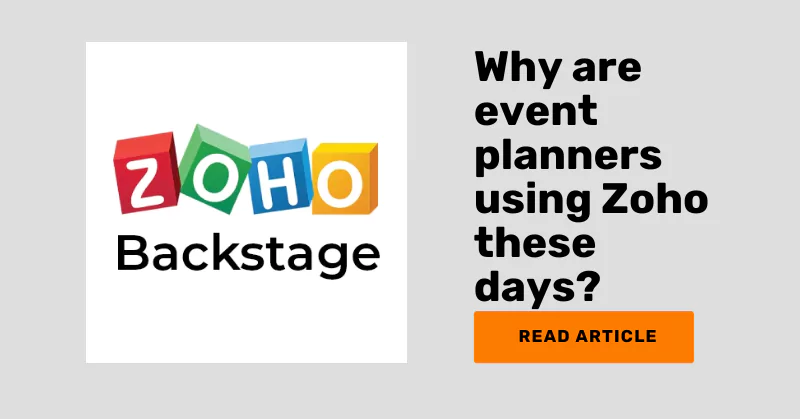Welcome to the world of corporate event marketing.
Picture this: A room full of business professionals shaking hands and sharing ideas. That’s what a successful corporate event looks like.
However, a lot of craft and skill goes into getting people to attend corporate events. They’re not a typical event where you go for fun.
There’s a very specific target audience so reaching them through marketing becomes crucial. So, let’s learn how we can do that.
A. What is corporate event marketing?
Corporate events are strategically planned events to achieve business goals.
Events like conferences, product launches, and seminars are organized. They help achieve a variety of goals like lead generation, brand awareness, and engaging stakeholders.

Corporate event marketing includes all the steps taken to market such events. The corporate event marketing strategy usually includes both online and offline marketing. Content creation, social media engagement, and strategic partnerships are all a part of it.
Corporate event marketing helps you make your event successful. Ultimately, it also helps achieve the company’s goals indirectly.
B. How to do corporate event marketing?
Yes, we are already at that section for which you searched the internet. Here’s your no-nonsense guide to corporate event marketing:
1. Questions to answer about the event
Before coming up with the marketing plan, you need to know the following details:
- What is the event’s name?
- Is there an expected theme at the event?
- What brands are affiliated with the event?
- How will attendees benefit from the event?
Answering these questions will tell exactly what you’re supposed to market.
2. Event schedule
Learn about the various programs and activities in the event. It can be a particular keynote speaker, workshop, and networking time.
These details will help you market specific elements of your event. Additionally, you’ll learn exactly what expectations you have to set.
3. Target audience
A lot of people can benefit from a particular event. But, you don’t want a random crowd. To get just the right people at your event, you need to define the demographic.
Learn about their demands and desires to create a marketing plan that attracts them.
4. Content management
Decide how you will release, update, and manage event information. Create a schedule for newsletters, social media updates, website updates, and event apps.
This ensures a streamlined flow of information leading up to the event.
Release information strategically to maintain attendee interest and curiosity.
Implement a multi-touch promotion strategy. You can do this by using diverse channels such as email, social media, phone calls, and ads.
5. Promotion during the event
Marketing doesn’t stop during the event.
Leverage social media platforms to engage attendees in real-time, sharing updates and photos.
Capitalize on social media for event promotion. This helps create a buzz that reaches both attendees and those who didn’t register. Also known as the FOMO effect!
C. Expert tips on event marketing

- Elevator pitch is for more than just getting funding or a job. You can use it to get whatever you want. So, have an elevator pitch even in your marketing campaigns
- Before you begin selling tickets, make sure you know who you’re selling to. Build a buyer’s persona for the person you’re selling to. For example: “Meet Alex, a young professional navigating the industry. Our event provides the guidance and connections needed for a successful career launch”
- Avoid cliches like “last chance to book” in your event posts. Instead, go for “Secure your seat at the innovation hub of the year”
- Personalize your emails and promotions. A little gesture like adding the name at the beginning of the email can have a huge impact. This can also be easily automated
- Replying quickly will help you convert casual browsers into event attendees. This is a small effort that helps bring about great changes
- Map out the attendee journey for strategic insights. Identify key decision points in the registration process to enhance the participant’s experience.
- Understand the importance of repetition. You could be repeating a hashtag, color scheme, email template, or post format. Over the course, you’ll develop a brand identity for the event. People will immediately think of your event when they catch a glimpse of any of your posts
- Embrace new tools and trends. For instance, QR-based ticketing systems and sustainable events
- Look at the event in a holistic way. Consider their excitement before the event, learning during the event, and networking after the event. By looking at it from a distance, you’ll be able to come up with more ideas
D. Branding in corporate event marketing

Events provide a huge branding potential. Any event planner knows that events are platforms for brand expression.
By creating immersive experiences, you will resonate with your target audience. But corporate events also leverage this opportunity to reinforce their brand identity.
With the creative and strategic placement of logos, you can do it ever so subtly. Reaching your ideal customers’ subconscious is possible through corporate event marketing.
To learn how to do this, you must read our event branding guide to learn some subtle marketing tricks.
E. PR in corporate event marketing
Before we get into the details, you must understand that events don’t occur in isolation. PR or public relations go hand in hand with corporate event marketing.
You need to think about the broader perception of your event. Therefore, securing media coverage and creating compelling narratives is a good idea.
If you combine your marketing efforts with PR, you can amplify your brand messaging to the masses. Even if everyone who is exposed to your PR efforts doesn’t buy a ticket, they still create a perception about your brand.
Do differentiate it from marketing because here the focus is on storytelling and not selling.
F. Cause-related corporate event marketing
In modern business, corporate social responsibility (CSR) is non-negotiable. However, instead of treating it as a mundane necessary job, you can integrate it into your marketing.
You can have certain philanthropic elements in your events. Some examples include:
- Dedicated hour for charity auctions
- Workshops for community outreach
- Having NGOs display their products
- Animal adoption/planting drive
By sharing the social responsibility, you can build a positive brand image. Clients will appreciate that you prioritize meaningful activities and not just sales.
People only want to get in business with people they respect and trust. If done well, you’ll have your clients convinced.
G. Why should you focus on corporate event marketing?

We’ve talked so much about corporate event marketing so far. But, we haven’t talked about why we need to worry about it so much.
Here are some of the many benefits of marketing corporate events:
- Better brand visibility directly to the target audience
- Lead generation through personalized pitching
- Attracting new clients, partners, and collaborators
- Positioning of the company as an industry leader
- Better relationship-building with clients, sponsors, and stakeholders
- Networking opportunities for all
- Thought leadership
- Reinforcing customer loyalty
- And of course, better event attendance
You can expand the horizons of these benefits through different event activities.
Pro Tip: You will achieve more goals through multiple small events instead of just one big event.
H. People also ask
1. What do you mean by a corporate event?
A corporate event is an organized gathering sponsored by businesses to meet their goals. They can be internal meetings or large-scale conferences too.
They serve a variety of purposes like employee engagement, brand awareness, and promotion. You can learn about the many types of corporate events.
2. How do you market an event company?
The primary method of marketing event companies is word of mouth. If you’re new in the market, this is how you’ll secure your first few clients.
Make sure to document all of these events. This will help you build a portfolio. You can later showcase this work online on your website or platforms like LinkedIn.
If you have a website, make sure its SEO is taken care of as that’s the only way you’ll be visible.
For fast-tracking your company growth, you can join event planning communities like EventTube. Learn from your competitors and improve your marketing efforts.
Emerging as a thought leader in the field by hosting workshops and writing insightful posts is the latest method.
3. What are the types of events?
There are many types of events that you could be organizing. Largely put, here are a few clusters:
- Private event management: This includes intimate gatherings like birthdays, weddings, and anniversaries
- Public event management: These are large-scale events like parades and fests
- School/college events: These are events in educational institutions like prom and graduation ceremonies
- Corporate event management: This includes business-focused events like conferences and product launches
- Cultural event management: This includes festival-related events like Christmas and Diwali
I. A word from EventTube
The marketing journey extends beyond promotions.
It’s about engaging attendees in real time, creating a buzz, and embracing new tools.
The article emphasizes the importance of many methods of marketing. Elevator pitch, personalized communication, and mapping the attendee journey are all part of it.
Branding, PR, and cause-related initiatives amplify the impact.
With these ideas, you should begin marketing your corporate event today. The results will also teach you all the lessons an article can’t cover.
You will learn only when you begin doing it.
We are here to become your idea bank in this journey. Sign up for the newsletter below to get all event updates.






